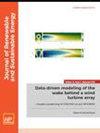基于深度强化学习的社区点对点能源交易
IF 1.9
4区 工程技术
Q4 ENERGY & FUELS
引用次数: 0
摘要
随着分布式能源资源的大量使用,越来越多的用户转变为具有生产、储存和消费电能功能的 "用电者"。点对点(P2P)能源交易作为一种允许用户之间直接进行能源交易的新方式,正变得越来越普遍。如何确定参与 P2P 能源交易的用户的交易策略,同时又能满足多个优化目标,是一个亟待解决的重要问题。为此,本文引入了需求响应机制,并应用不满意度函数来表示用户的用电量。为了吸引更多的用电户参与 P2P 能源交易,本文采用了中间市场费率价格。社区中多个消费者之间的 P2P 能源交易过程被构建为马尔可夫决策过程。我们设计了一种深度强化学习(DRL)方法来求解用户的最优交易策略。DRL 通过与环境持续互动,自主学习最优策略。此外,深度确定性策略梯度算法非常适合处理 P2P 能源交易市场中出现的连续而复杂的决策问题。通过合理构建强化学习环境,本文实现了多目标协同优化。仿真结果表明,与用户和电网之间的交易相比,我们提出的算法和模型降低了 16.5% 的成本,并能有效降低用户对主电网的依赖。本文章由计算机程序翻译,如有差异,请以英文原文为准。
Peer-to-peer energy trading in a community based on deep reinforcement learning
With the massive access to distributed energy resources, an increasing number of users have transformed into prosumers with the functions of producing, storing, and consuming electric energy. Peer-to-peer (P2P) energy trading, as a new way to allow direct energy transactions between prosumers, is becoming increasingly widespread. How to determine the trading strategy of prosumers participating in P2P energy trading while the strategy can satisfy multiple optimization objectives simultaneously is a crucial problem to be solved. To this end, this paper introduces the demand response mechanism and applies the dissatisfaction function to represent the electricity consumption of prosumers. The mid-market rate price is adopted to attract more prosumers to participate in P2P energy trading. The P2P energy trading process among multiple prosumers in the community is constructed as a Markov decision process. We design the method of deep reinforcement learning (DRL) to solve the optimal trading policy of prosumers. DRL, by engaging in continual interactions with the environment, autonomously learns the optimal strategies. Additionally, the deep deterministic policy gradient algorithm is well-suited for handling the continuous and intricate decision problems that arise in the P2P energy trading market. Through the judicious construction of a reinforcement learning environment, this paper achieves multi-objective collaborative optimization. Simulation results show that our proposed algorithm and model reduce costs by 16.5%, compared to the transaction between prosumers and grid, and can effectively decrease the dependence of prosumers on the main grid.
求助全文
通过发布文献求助,成功后即可免费获取论文全文。
去求助
来源期刊

Journal of Renewable and Sustainable Energy
ENERGY & FUELS-ENERGY & FUELS
CiteScore
4.30
自引率
12.00%
发文量
122
审稿时长
4.2 months
期刊介绍:
The Journal of Renewable and Sustainable Energy (JRSE) is an interdisciplinary, peer-reviewed journal covering all areas of renewable and sustainable energy relevant to the physical science and engineering communities. The interdisciplinary approach of the publication ensures that the editors draw from researchers worldwide in a diverse range of fields.
Topics covered include:
Renewable energy economics and policy
Renewable energy resource assessment
Solar energy: photovoltaics, solar thermal energy, solar energy for fuels
Wind energy: wind farms, rotors and blades, on- and offshore wind conditions, aerodynamics, fluid dynamics
Bioenergy: biofuels, biomass conversion, artificial photosynthesis
Distributed energy generation: rooftop PV, distributed fuel cells, distributed wind, micro-hydrogen power generation
Power distribution & systems modeling: power electronics and controls, smart grid
Energy efficient buildings: smart windows, PV, wind, power management
Energy conversion: flexoelectric, piezoelectric, thermoelectric, other technologies
Energy storage: batteries, supercapacitors, hydrogen storage, other fuels
Fuel cells: proton exchange membrane cells, solid oxide cells, hybrid fuel cells, other
Marine and hydroelectric energy: dams, tides, waves, other
Transportation: alternative vehicle technologies, plug-in technologies, other
Geothermal energy
 求助内容:
求助内容: 应助结果提醒方式:
应助结果提醒方式:


